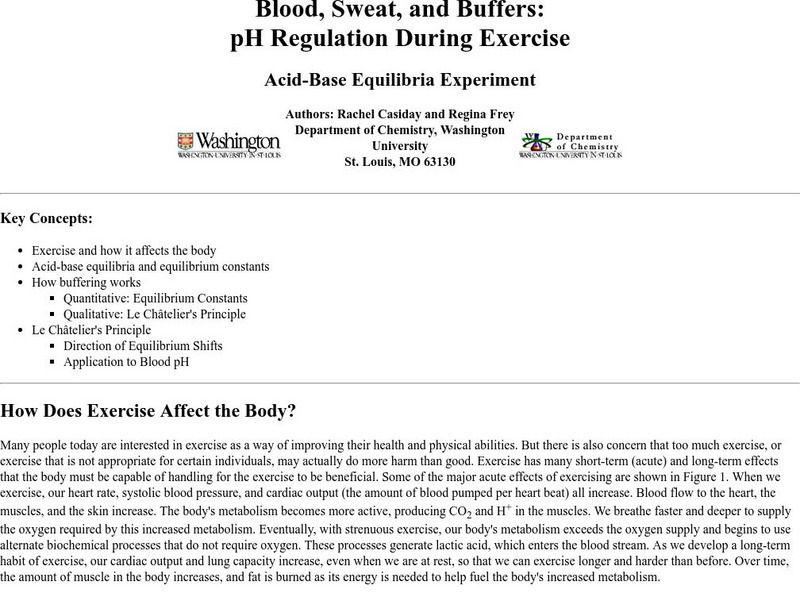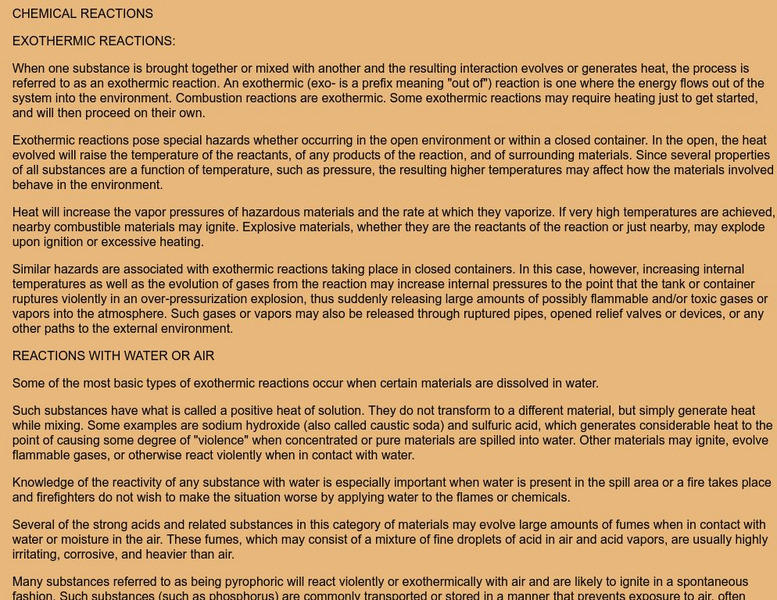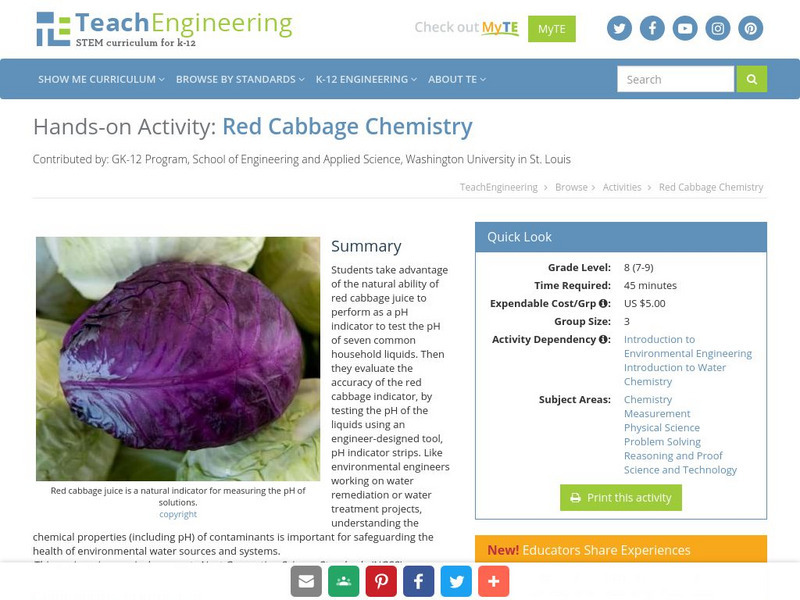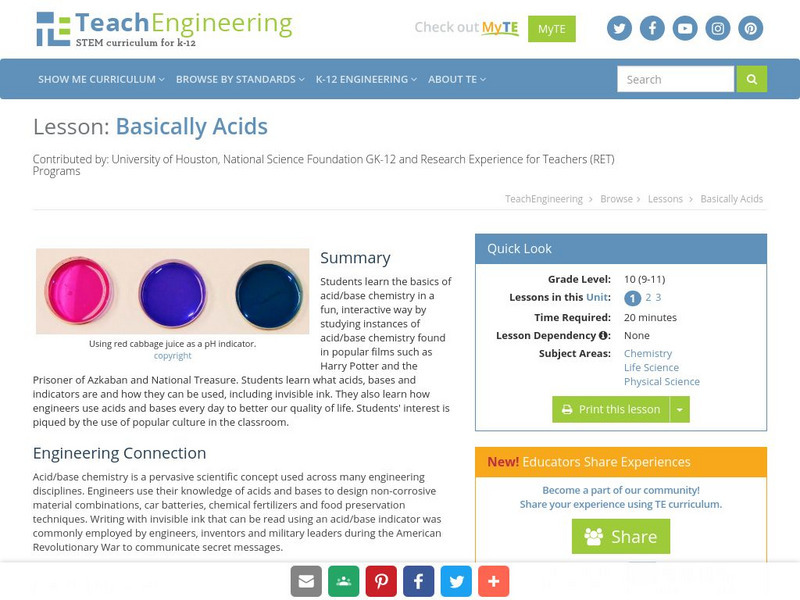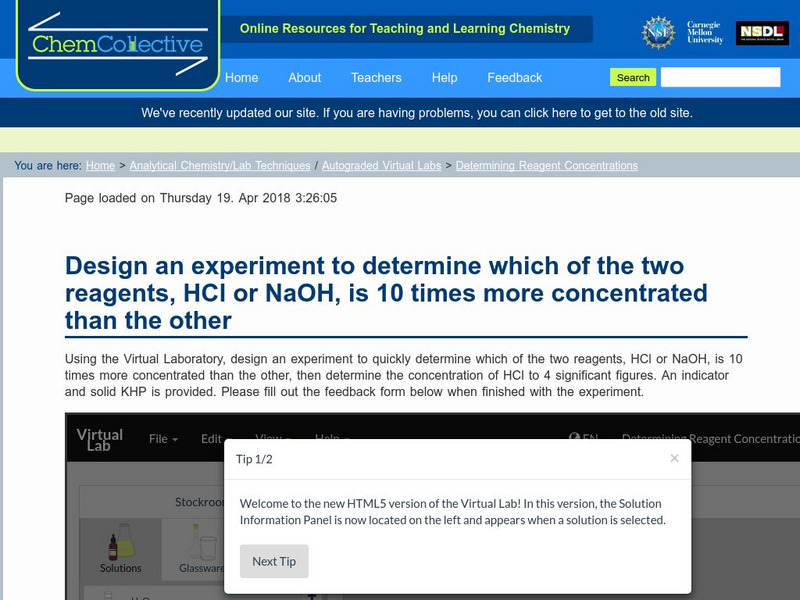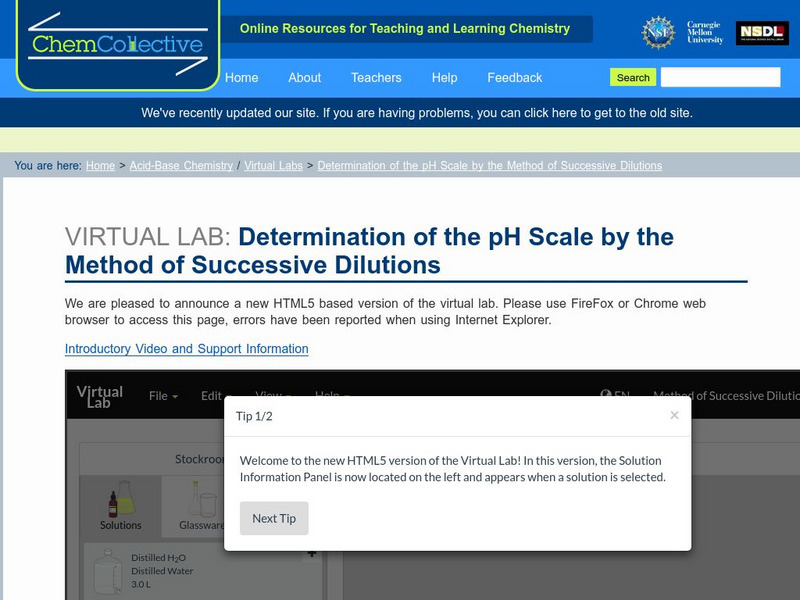Science Education Resource Center at Carleton College
Serc: Investigating P H of Common Household Substances
Students investigate the pH level of household substances by testing a variety of common compounds. Substances are tested with pH strips and placed on the continuum of the pH scale range of 1 to 14. After testing a solution, the student...
American Chemical Society
Middle School Chemistry: P H and Color Change
Young scholars see a demonstration of a color change using universal pH indicator and then change the concentrations of an acid and a base using a universal indicator to test the pH of the resulting solutions. Through an animation, they...
Other
Washington University: P H Buffers in the Blood
This site from the Department of Chemistry at the Washington University is an excellent site on how buffers are used in the human body and how they react to exercise.
Other
Chemical Reax/exothermic Reactions
A wonderfully complete primer on exothermic reactions in the context of chemical spills. Covers Reactions with Air or Water, Combustible Organics, Polymerization Reax, Decomposition, Corrosion, and much much more.
Alabama Learning Exchange
Alex: The Laws of Exponents
This lesson plan walks middle schoolers through understanding and applying laws of exponents. It gives an assessment and ideas for remediation, extension as well as ways to manage behavior problems and reluctant learners.
John Wiley & Sons
Concepts in Biochemistry: Concept Reviews: Water, P H, and Non Covalent Bonding
A detailed review of water and its structure. Included are diagrams, animated graphics, and review quizzes. For the advanced high school student.
Clackamas Community College
Clackamas Community College: Amides
A nice website for information on amides. Discusses how they are formed, their structure, the guidelines for naming them (along with examples and practice problems), and the kinds of reactions that amides undergo.
Khan Academy
Khan Academy: Water Autoionization and Kw
Learn about the autoionization of water, the autoionization constant Kw, and the relationship between [H+] and [OH-] in aqueous solutions.
TeachEngineering
Teach Engineering: Acid (And Base) Rainbows
Students are introduced to the differences between acids and bases and how to use indicators, such as pH paper and red cabbage juice, to distinguish between them.
TeachEngineering
Teach Engineering: Breathing Cells
Students use a simple pH indicator to measure how much CO2 is produced during respiration, at rest and after exercising. They begin by comparing some common household solutions in order to determine the color change of the indicator....
TeachEngineering
Teach Engineering: Basically Acidic Ink
Students hypothesize whether vinegar and ammonia-based glass cleaner are acids or bases. They create designs on index cards using these substances as invisible inks. After the index cards have dried, they apply red cabbage juice as an...
TeachEngineering
Teach Engineering: Red Cabbage Chemistry
Students take advantage of the natural ability of red cabbage juice to perform as a pH indicator to test the pH of seven common household liquids. Then they evaluate the accuracy of the red cabbage indicator, by testing the pH of the...
TeachEngineering
Teach Engineering: Basically Acids
Students learn the basics of acid/base chemistry in a fun, interactive way by studying instances of acid/base chemistry found in popular films such as Harry Potter and the Prisoner of Azkaban and National Treasure. Students learn what...
Wyzant
Wyzant: Acids and Bases
This site presents everything you need to know about acids and bases and more! Gives a nice description on what acids and bases are, properties of both, strong and weak acids and bases, an overview of pH, and much more.
Chemistry Collective
Chem Collective: Current Collection of Virtual Lab Problems
A collection of over 30 virtual chemistry problems with accompanying interactive activities. Each problem includes a word file for potential differentiation in your classroom.
Interactive Mathematics
Interactive Mathematics: Exponential and Logarithmic Functions
This is a comprehensive tutorial on Exponential and Logarithmic Functions
Chemistry Collective
Chem Collective: Unknown Weak Acid Problem Bonus
Perform an experiment to determine the concentrations of a mixture of two acids.
Chemistry Collective
Chem Collective: Determine the Concentration of the Unknown Strong Acid
Perform a titration using an indicator to determine the concentration of an HCl solution.
Chemistry Collective
Chem Collective: Determining the Concentration of an Unknown Solution
Using the Virtual Laboratory design, students perform an experiment to determine the concentration of the unknown HCl solution to four significant figures.
Chemistry Collective
Chem Collective: Determining Reagent Concentrations
Using the Virtual Laboratory, design an experiment to quickly determine which of the two reagents, HCl or NaOH, is 10 times more concentrated than the other.
Chemistry Collective
Chem Collective: Determine the Concentration of Acetic Acid in Vinegar
A virtual lab where students determine the concentration of acetic acid in vinegar using a 0.110 M NaOH standard solution and an acid-base indicator, phenolphthalein.
Chemistry Collective
Chem Collective: Unknown Base Problem
Perform an experiment to determine the pKa and concentration of an unknown weak base.
Chemistry Collective
Chem Collective: P H and Buffers Defined
This tutorial presents a review of the definitions for pH and buffer solutions
Chemistry Collective
Chem Collective: Determination of the P H Scale
This virtual lab activity where students perform the method of successive dilutions using HCl, NaOH, a pH meter, and universal indicator solution to help understand the logarithmic nature of the pH scale.




